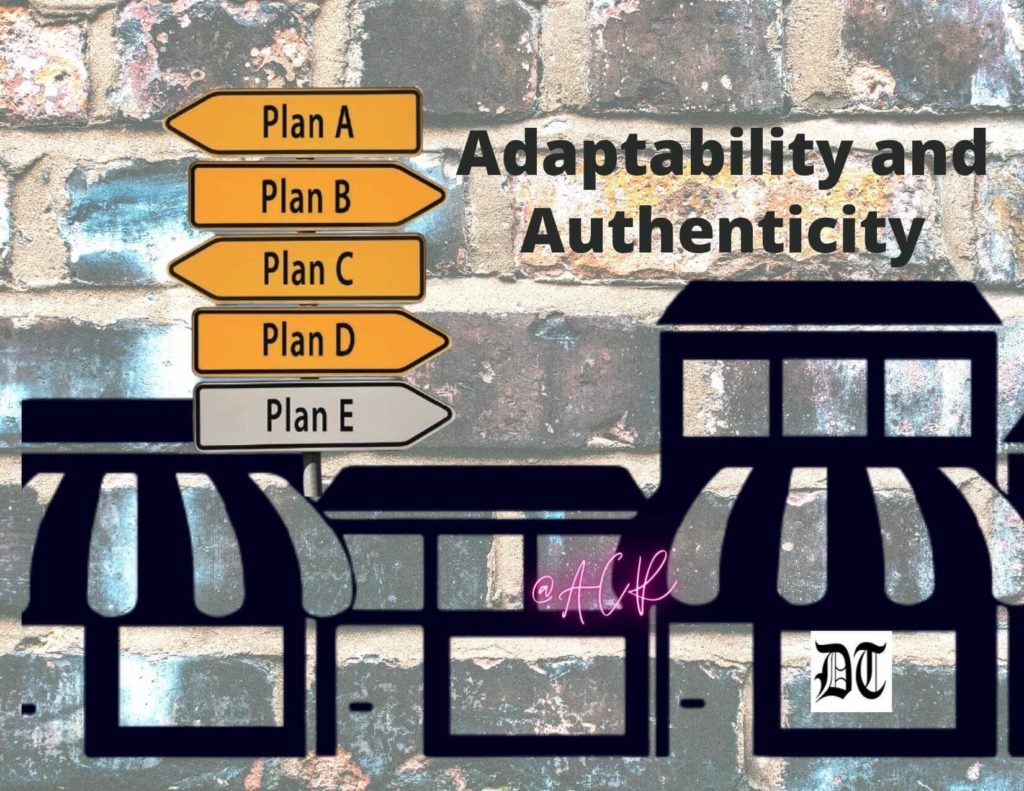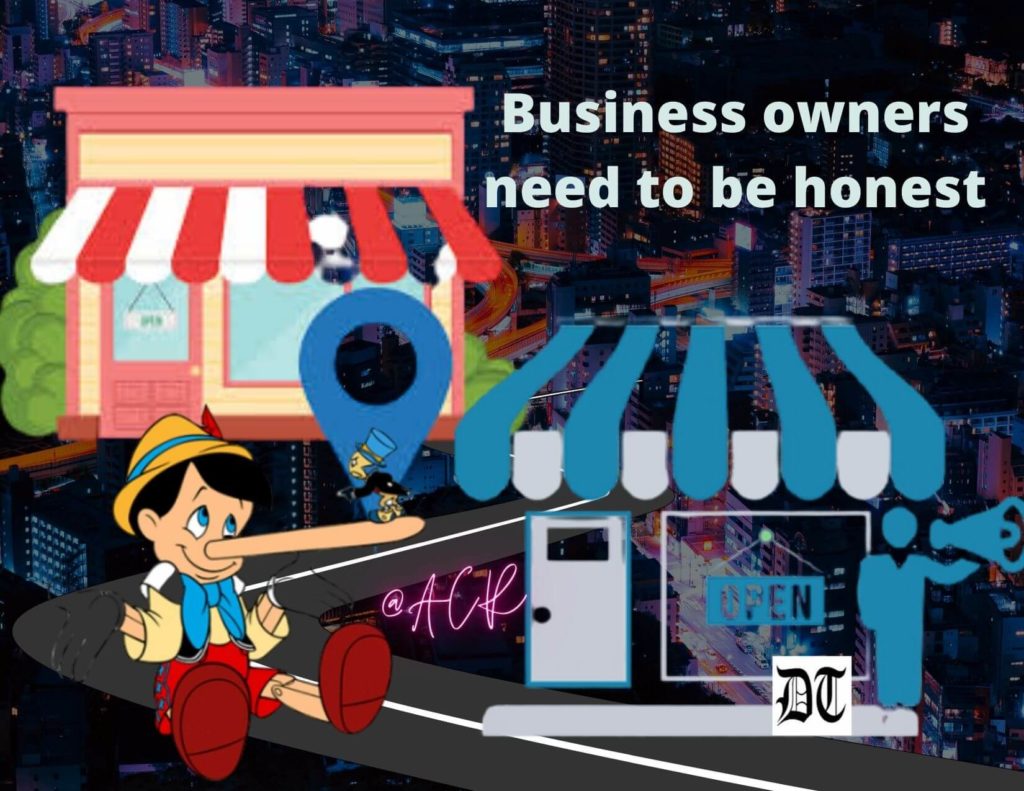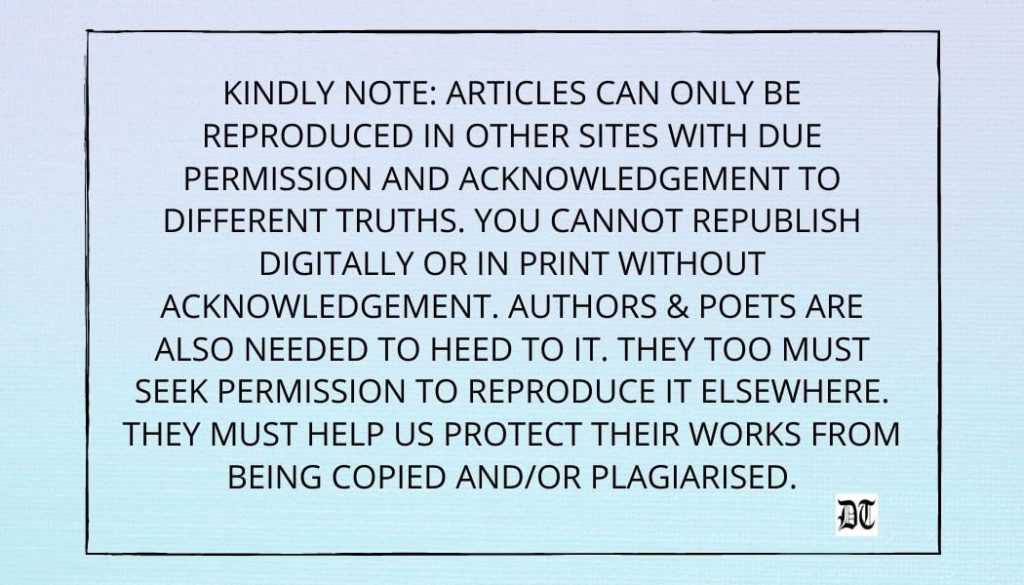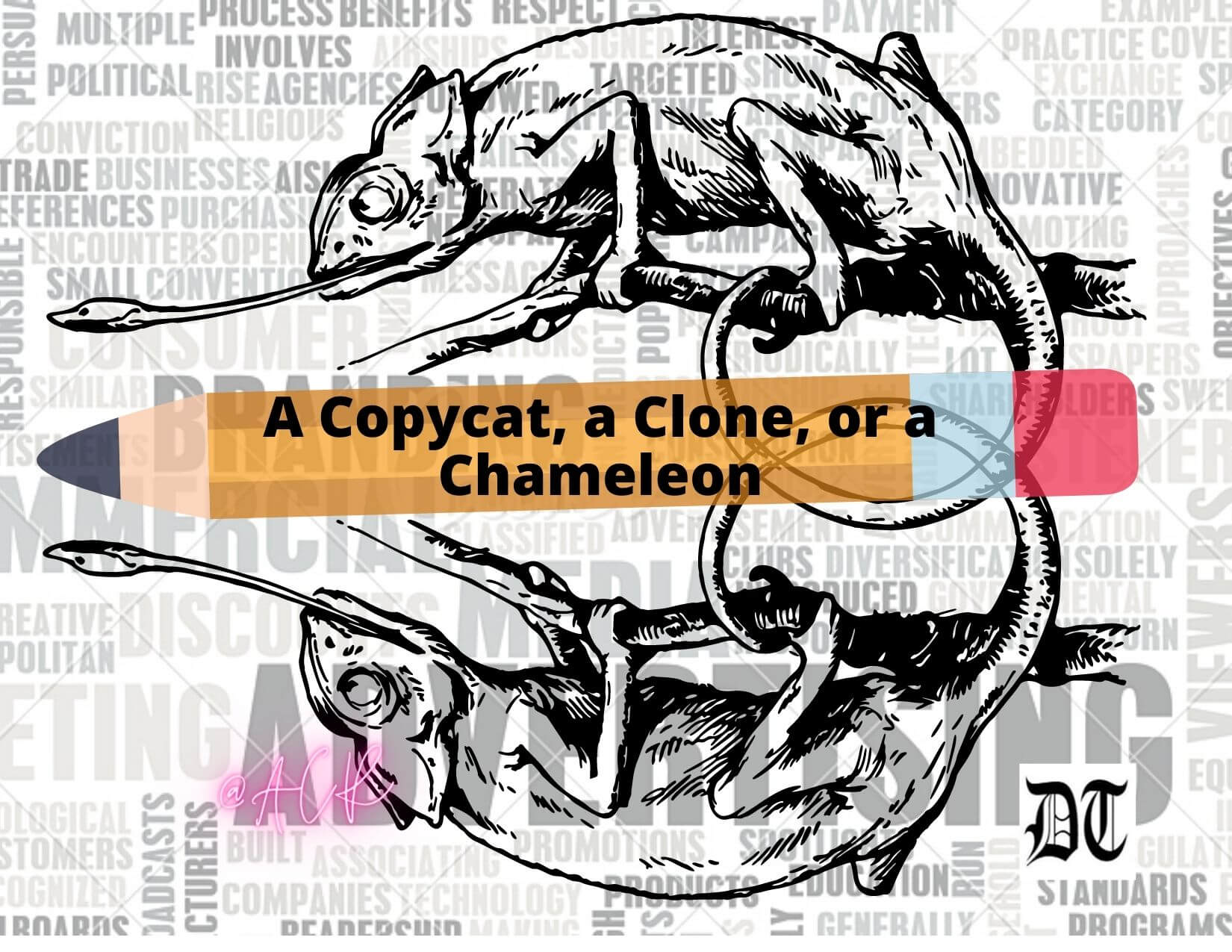Reading Time: 8 minutes
As pandemic crippled businesses, some companies and brands diversified into adjacent products or services, by capitalising on emerging themes. With a focus on sustainability and environment-friendliness and a higher degree of local content. Urna, an advertisement professional, Executive Creative Director, working across verticals and multi-categories, analyses the changing scenario, exclusively for Different Truths.
Have you ever heard someone calling some other person a “chameleon”?
In everyday, colloquial parlance, calling someone a chameleon is a snide jab, at best. A derogatory, demeaning insult, at worse.
Human chameleons, as we understand this metaphor, are people who’re shrewd, manipulative and basically devoid of scruples, values or principles.
The term, “chameleon” insinuates the person can adapt and fit into any group or situation and make it work to their advantage, even at the cost of letting go of what he or she primarily stands for. Human chameleons, as we understand this metaphor, are people who’re shrewd, manipulative and basically devoid of scruples, values or principles.
That is how we have used, understood, and grasped the chameleon metaphor, more or less, in a socio-cultural-linguistic way, for quite some time now.
Then along came 2020. A dystopian year, almost right out of a Robin Cook’s book. A teeny-tiny, almost invisible virus flexed its muscles and brought the colossal human ego and our towering sense of superiority, both down on their metaphorical knees.
Then along came 2020. A dystopian year, almost right out of a Robin Cook’s book. A teeny-tiny, almost invisible virus flexed its muscles and brought the colossal human ego and our towering sense of superiority, both down on their metaphorical knees. A year that has literally punched us in the face, telling us again and again that “control” is only an illusion.
With job markets around the world in doldrums and the stock markets spiralling downwards, the sense of gloom is real. As the GDPs of nations fall and crumble as a cookie dipped in your tea, the helplessness is palpable and universal. Sadly, and shockingly, the past seven months or so have witnessed many smaller brands and businesses pulling the shutter down on their dreams. With heavy, bleeding hearts and not knowing whether the wheel would ever turn in their favour or not, they were pushed to the brink.
Unlike big businesses that have collaterals, micro, small and medium enterprises (MSMEs), which contribute to roughly 29 – 30 per cent of India’s GDP and generate close to 11 crore jobs, have been crushed by the Coronavirus outbreak. With demands slipping, cash flows frozen and employee payrolls piling up, the grim question is what does one do?
Unlike big businesses that have collaterals, micro, small and medium enterprises (MSMEs), which contribute to roughly 29 – 30 per cent of India’s GDP and generate close to 11 crore jobs, have been crushed by the Coronavirus outbreak. With demands slipping, cash flows frozen and employee payrolls piling up, the grim question is what does one do?
Well broadly speaking, if we may, there are two things one can do.
Option One. Sink into severe mental, psychological, financial depression and anxiety.
Option Two. Take a few lessons from our small reptile friend, the chameleon. Who unlike what the colloquially used metaphor suggests never compromises on his or her sense of purpose, goal, or core existential values if you please. But more of the chameleon, a little later.
In fact, according to a PwC India report, around one out of every three companies, is expected to develop new products or offer new services as they recover from the Coronavirus pandemic.
As the pandemic showed no signs of cowing down, many companies started looking at offering new products. In fact, according to a PwC India report, around one out of every three companies, is expected to develop new products or offer new services as they recover from the Coronavirus pandemic.
In other words, some companies and brands are seriously looking at diversification into adjacent products or services, by capitalising on emerging themes. With a focus on sustainability and environment friendliness and a higher degree of local content. Many of these companies, with plans to start something new hope to do so in areas close to their core competence, according to the PwC India report.
Take for instance an automobile company that started offering electric vehicles to disinfect factories, malls and offices by fogging and spraying to prevent the spread of the Coronavirus.
Then there’s the Coimbatore-based catering company Madhampatty Thangavelu Food Factory, which stopped receiving catering orders. Due to the pandemic and lockdown, there were no events in the city and managing partner, Krishnakumar Thangavel was in a fix…. So Krishnakumar and his partners decided to focus on this unique strength and boost the manufacturing of sweets.
Then there’s the Coimbatore-based catering company Madhampatty Thangavelu Food Factory, which stopped receiving catering orders. Due to the pandemic and lockdown, there were no events in the city and managing partner, Krishnakumar Thangavel was in a fix. Now, the Madhampatty Thangavelu Food Factory usually catered to large weddings and was therefore proficient in making sweets. So Krishnakumar and his partners decided to focus on this unique strength and boost the manufacturing of sweets. They also took the help of Effitrac, an end-to-end business process management solutions company, to reach their customers. So, this small catering business not only intelligently diversified into manufacturing sweets but is now successfully managing e-commerce orders within the Effitrac platform, as well.
Now, let’s take a look at some of the biggies. Brands like Amazon India have taken upon themselves the responsibility of reviving the businesses of small sellers and brands. Amazon India in fact, is investing enormously in this cause. Their most recent program ‘Local Shops’ helps customers as well as small, local kiranas, in the neighbourhood. This in turn has helped Amazon deliver to 100 per cent of pin codes in India and become the most trusted online shopping site.
Then there is Cadbury Celebrations, which offered a unique real-time data experience in a Cadbury ad where it advertised not just for itself but also for thousands of small businesses across India. The displayed small stores in the ad changed based on the location, in which the ad was being viewed.
Then there is Cadbury Celebrations, which offered a unique real-time data experience in a Cadbury ad where it advertised not just for itself but also for thousands of small businesses across India. The displayed small stores in the ad changed based on the location, in which the ad was being viewed. For example, a person viewing the ad in Pune would be guided to small stores in Pune, in their vicinity.
Well, these are just a few examples of how businesses and brands at different ends of the spectrum are making a conscious, strategic choice to be adaptable and innovate, on their feet. Even as the market dynamics swing back and forth.
But the overall business scenario is anything but pretty, as we stand here in November 2020. And the question remains how will small and medium-sized businesses cope and navigate the newly emerging business complexities? Or how will each one of us, individualistically and professionally, make sense of all this chaos?
But the overall business scenario is anything but pretty, as we stand here in November 2020. And the question remains how will small and medium-sized businesses cope and navigate the newly emerging business complexities?
This then, once again, brings me back to our reptile friend, the chameleon and taking a few valuable lessons from him.
Chameleons have this special ability to adapt to whatever environment they are in. For instance, whether a chameleon is amidst luscious greenery or dirt and dust, it changes the colour of its skin to reflect its environment. The chameleon does this because it needs to camouflage itself as a means of survival.
No matter what kind of environment a chameleon is in, it never changes what his true mission or goal maybe. If a chameleon needs food, it will aggressively hunt for food. And that sense of purpose I assure you, will not change. The chameleon will merely adapt itself to the environment
Now here’s the point that needs to be mulled upon. No matter what kind of environment a chameleon is in, it never changes what his true mission or goal maybe. If a chameleon needs food, it will aggressively hunt for food. And that sense of purpose I assure you, will not change. The chameleon will merely adapt itself to the environment, to keep itself safe from possible predators, so that it is in the best possible position to go after the things it needs to go after, irrespective of the changing environment.
Think about it. That’s just not plain, vanilla adaptability. It’s what business leaders and strategic gurus teach at B-schools. It’s called focussed adaptability.
So somewhere along the way, the chameleon metaphor needs a resurrection of sorts. We can no longer make the collective mistake of confusing being “adaptable” to surrendering or compromising our business ethics, values, or principles. The confusion as described arises when we naively attempt to define ourselves, our businesses, and our world in absolutes.
So somewhere along the way, the chameleon metaphor needs a resurrection of sorts. We can no longer make the collective mistake of confusing being “adaptable” to surrendering or compromising our business ethics, values, or principles. The confusion as described arises when we naively attempt to define ourselves, our businesses, and our world in absolutes. Or through dumbed-down notions of black or white.

Yes, “adaptability” and “authenticity”, as the chameleon teaches us, are not and don’t have to be mutually exclusive or arch enemies, right?
But before we are convinced where and how to adapt, let’s understand this won’t be straightforward or straitjacketed either. Our academic institutions and educational courses, with all due respect, have bred more and more conventionality. Preparing us for a uniform, predictable world. Making each one of us, one of the flocks, one of the herd.
Yet, 2020 has attacked the generic rules, mass methods and the tried-and-tested ways of the past, with the brutality of a hungry predator. And if this year from hell, is forcing us to do one thing, it’s this. To discover and rediscover our strength of character and our collective and individualistic human DNA of adaptability.
The solution won’t lie in being “another brick in the wall” like the iconic Pink Floyd song says. The solution won’t lie in being a desperate copycat, mindlessly following rules, ideas, algorithms and methods that don’t fit into your scheme of things. The solution won’t lie in being an obedient clone either.
The solution won’t lie in being “another brick in the wall”, like the iconic Pink Floyd song says. The solution won’t lie in being a desperate copycat, mindlessly following rules, ideas, algorithms and methods that don’t fit into your scheme of things. The solution won’t lie in being an obedient clone either. Remember Dolly was a sheep, and sheep are good at grazing in herds, not managing change.
Right now, everything is at stake. And going forward, smaller and medium-sized businesses, entrepreneurs and professionals will have to take a look at who they are, at their very core. For each business path or career, the graph is different, yet unique. And there isn’t anyone size that fits all when it comes to business or career goals, bottom-line demands, diversification capabilities, sustainability requirements etc.
Part of the solution, if not entirely, perhaps will come from deep-diving into ourselves, our businesses, enterprises, and our line of work. And in admitting who we are and who we are not. Part of the solution will perhaps come from understanding it’s alright to be a chameleon. If we remain true to our sense of purpose and never short-change authenticity and integrity.

So, the need of the hour for business leaders, entrepreneurs, heads of organisations and even professional individuals is to be scathingly honest. Part of the solution, if not entirely, perhaps will come from deep-diving into ourselves, our businesses, enterprises, and our line of work. And in admitting who we are and who we are not. Part of the solution will perhaps come from understanding it’s alright to be a chameleon. If we remain true to our sense of purpose and never short-change authenticity and integrity.
And as the doom and the darkness, slowly give way, we will surely be able to see the light. Feel the light, soak up the light and hold the light in our collective palm. Hopefully sooner than later. Till then let’s cultivate our inner chameleons, and oh yes wish you all a very Happy Diwali.
Visuals from Different Truths and videos from the internet.
















Like it.looking from supply perspective of survival.but there is demand side story also.